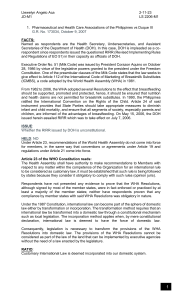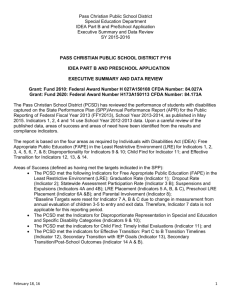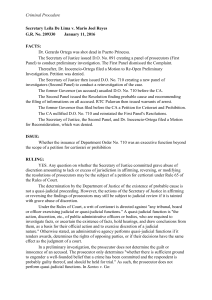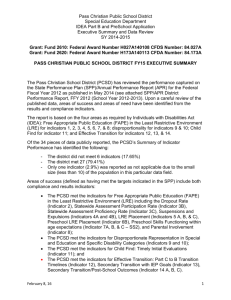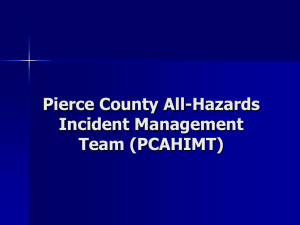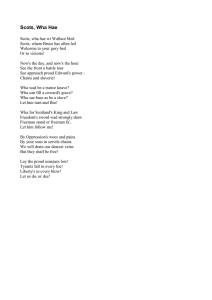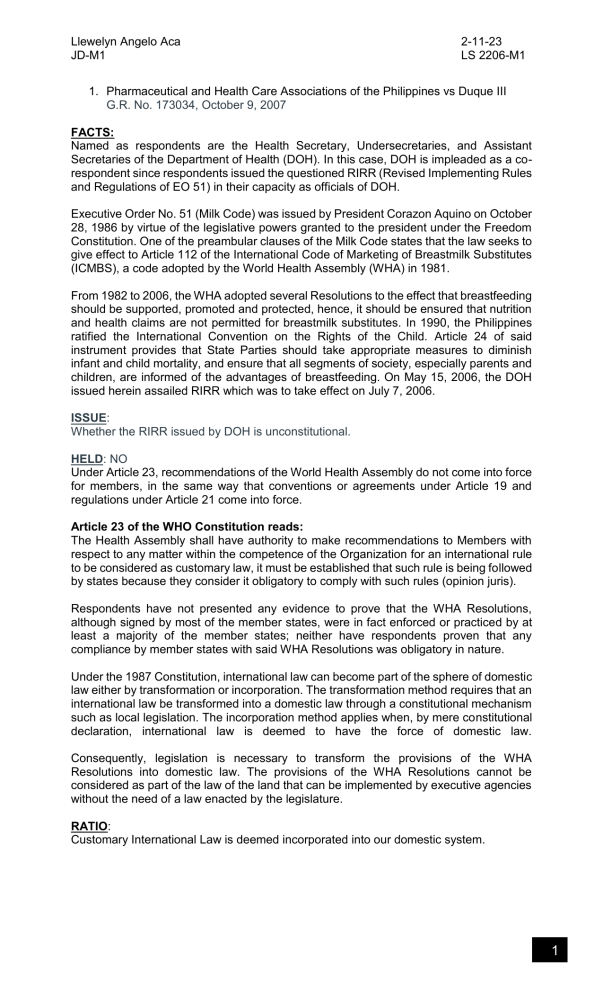
Llewelyn Angelo Aca JD-M1 2-11-23 LS 2206-M1 1. Pharmaceutical and Health Care Associations of the Philippines vs Duque III G.R. No. 173034, October 9, 2007 FACTS: Named as respondents are the Health Secretary, Undersecretaries, and Assistant Secretaries of the Department of Health (DOH). In this case, DOH is impleaded as a corespondent since respondents issued the questioned RIRR (Revised Implementing Rules and Regulations of EO 51) in their capacity as officials of DOH. Executive Order No. 51 (Milk Code) was issued by President Corazon Aquino on October 28, 1986 by virtue of the legislative powers granted to the president under the Freedom Constitution. One of the preambular clauses of the Milk Code states that the law seeks to give effect to Article 112 of the International Code of Marketing of Breastmilk Substitutes (ICMBS), a code adopted by the World Health Assembly (WHA) in 1981. From 1982 to 2006, the WHA adopted several Resolutions to the effect that breastfeeding should be supported, promoted and protected, hence, it should be ensured that nutrition and health claims are not permitted for breastmilk substitutes. In 1990, the Philippines ratified the International Convention on the Rights of the Child. Article 24 of said instrument provides that State Parties should take appropriate measures to diminish infant and child mortality, and ensure that all segments of society, especially parents and children, are informed of the advantages of breastfeeding. On May 15, 2006, the DOH issued herein assailed RIRR which was to take effect on July 7, 2006. ISSUE: Whether the RIRR issued by DOH is unconstitutional. HELD: NO Under Article 23, recommendations of the World Health Assembly do not come into force for members, in the same way that conventions or agreements under Article 19 and regulations under Article 21 come into force. Article 23 of the WHO Constitution reads: The Health Assembly shall have authority to make recommendations to Members with respect to any matter within the competence of the Organization for an international rule to be considered as customary law, it must be established that such rule is being followed by states because they consider it obligatory to comply with such rules (opinion juris). Respondents have not presented any evidence to prove that the WHA Resolutions, although signed by most of the member states, were in fact enforced or practiced by at least a majority of the member states; neither have respondents proven that any compliance by member states with said WHA Resolutions was obligatory in nature. Under the 1987 Constitution, international law can become part of the sphere of domestic law either by transformation or incorporation. The transformation method requires that an international law be transformed into a domestic law through a constitutional mechanism such as local legislation. The incorporation method applies when, by mere constitutional declaration, international law is deemed to have the force of domestic law. Consequently, legislation is necessary to transform the provisions of the WHA Resolutions into domestic law. The provisions of the WHA Resolutions cannot be considered as part of the law of the land that can be implemented by executive agencies without the need of a law enacted by the legislature. RATIO: Customary International Law is deemed incorporated into our domestic system. 1 Llewelyn Angelo Aca JD-M1 2-11-23 LS 2206-M1 2. FBDC vs. CIR, G.R. No. 158885 and 170680, October 2, 2009 FACTS: Petitioner Fort Bonifacio Development Corporation (FBDC) is a duly registered domestic corporation engaged in the development and sale of real property. The Bases Conversion Development Authority (BCDA), a wholly owned government corporation created under Republic Act (RA) No. 7227, owns 45% of petitioner’s issued and outstanding capital stock; while the Bonifacio Land Corporation, a consortium of private domestic corporations, owns the remaining 55%. FBDC purchased from the national government a portion of the Fort Bonifacio reservation. On January 1, 1996, the enactment of RA 7716 extended the coverage of VAT to real properties held primarily for sale to customers or held for lease in the ordinary course of trade or business. Thus, FBDC sought to register by submitting to BIR an inventory of all its real properties, the book value of which aggregated to about P71 B. FBDC started selling Global City lots to interested buyers. For the first quarter of 1997, it paid the output VAT by making cash payments to the BIR and credited its unutilized input tax credit on purchases of goods and services. Realizing that its 8% transitional input tax credit was not applied in computing its output VAT for the first quarter of 1997, FBDC filed with the BIR a claim for refund of the amount erroneously paid as output VAT for the said period. The Court of Tax Appeals denied refund on the ground that the benefit of transitional input tax credit comes with the condition that business taxes should have been first paid. The CTA likewise pointed out that under RR 7-95, implementing Section 105 of the old NIRC, the 8% transitional input tax credit should be based on the value of the improvements on land such as buildings, roads, drainage system and other similar structures, constructed on or after January 1, 1998, and not on the book value of the real property. ISSUE: Whether section 4.105-1 of RR 7-95 is inconsistent with section 105 of the old tax code. HELD: YES This is because it limits the 8% transitional input tax credit to the value of the improvements on the land, the same contravenes the provision of Section 105 of the old NIRC, in relation to Section 100 of the same Code, as amended by RA 7716, which defines "goods or properties," to wit: The term "goods or properties" shall mean all tangible and intangible objects which are capable of pecuniary estimation and shall include: (A) Real properties held primarily for sale to customers or held for lease in the ordinary course of trade or business; x x x To be valid, an administrative rule or regulation must conform, not contradict, the provisions of the enabling law. An implementing rule or regulation cannot modify, expand, or subtract from the law it is intended to implement. While administrative agencies like the BIR, may issue regulations to implement statutes, they are without authority to limit the scope of the statute to less than what it provides, or extend or expand the statute beyond its terms, or in any way modify explicit provisions of the law. Indeed, a quasi-judicial body or an administrative agency for that matter cannot amend an act of Congress. Hence, in case of a discrepancy between the basic law and an interpretative or administrative ruling, the basic law prevails. RATIO: An administrative rule or regulation cannot contravene the law on which it is based. Any rule that is not consistent with the statute itself is null and void. 3. C.T. Torres Enterprises, Inc. vs. Hibionada, G.R. No. 80916, November 9, 1990 2 Llewelyn Angelo Aca JD-M1 2-11-23 LS 2206-M1 FACTS: The petitioner as agent of private respondent Pleasantville Development Corporation sold a subdivision lot on installment to private respondent Efren Diongon. The installment payments having been completed, Diongon demanded the delivery of the certificate of title to the subject land. When neither the petitioner nor Pleasantville complied, he filed a complaint against them for specific performance and damages in the Regional Trial Court of Negros Occidental against CTTE and PDC. After it was set for an initial hearing, CTTE filed a motion to dismiss for lack of jurisdiction, contending that HLURB is the competent body. The trial court then denied the motion saying that the issue is contracts under the Civil Code for which jurisdiction over it is granted to the trial court under BP 129. ISSUE: Whether the jurisdiction lies under the HLURB. HELD: YES It is clear from Section 1(c) of PD No. 1344 that the complaint for specific performance with damages filed by Diongon with the Regional Trial Court of Negros Occidental comes under the jurisdiction of the Housing and Land Use Regulatory Board. Diongon is a buyer of a subdivision lot seeking specific performance of the seller's obligation to deliver to him the corresponding certificate of title. The argument that only courts of justice can adjudicate claims resoluble under the provisions of the Civil Code is out of step with the fast-changing times. There are hundreds of administrative bodies now performing this function by virtue of a valid authorization from the legislature. This quasi-judicial function, as it is called, is exercised by them as an incident of the principal power entrusted to them of regulating certain activities falling under their particular expertise. It is by now commonplace learning that many administrative agencies exercise and perform adjudicatory powers and functions, though to a limited extent only. Limited delegation of judicial or quasi-judicial authority to administrative agencies is well recognized in our jurisdiction, basically because the need for special competence and experience has been recognized as essential in the resolution of questions of complex or specialized character and because of a companion recognition that the dockets of our regular courts have remained crowded and clogged. RATIO: There is no question that a statute may vest exclusive original jurisdiction in an administrative agency over certain disputes and controversies falling within the agency's special expertise. The very definition of an administrative agency includes its being vested with quasi-judicial powers. 3 Llewelyn Angelo Aca JD-M1 2-11-23 LS 2206-M1 4. Villanueva vs. Palawan Council for Sustainable Development, G.R. No. 178347, February 25, 2013 FACTS: On June 19, 1992, Republic Act (RA) No. 7611 or the "Strategic Environment Plan (SEP) for Palawan Act" was signed into law. It called for the establishment of the Environmentally Critical Areas Network (ECAN), which is a "graded system of protection and development control over the whole of Palawan. Pursuant to its rule-making authority under RA 7611, the PCSD promulgated the SEP Clearance Guidelines, which require all proposed undertakings in the Palawan province to have an SEP Clearance from PCSD before application for permits, licenses, patents, grants, or concessions with the relevant government agencies. Generally, the PCSD issues the clearance if the ECAN allows the type of proposed activity in the proposed site; it denies the clearance if the ECAN prohibits the type of proposed activity in the proposed site. The controversy in the instant case arose when PCSD issued an SEP Clearance to Patricia Louise Mining and Development Corporation (PLMDC) for its proposed smallscale nickel mining project to be conducted in a controlled use area in Barangay Calategas in the Municipality of Narra, Province of Palawan. The petitioners, who are farmers and residents of Barangay Calategas, sought the recall of the said clearance in their letter to PCSD Chairman, Abraham Kahlil Mitra. The PCSD, through its Executive Director, Romeo B. Dorado, denied their request for lack of basis. On August 7, 2006, petitioners filed a Petition for Certiorari and Mandamus against PCSD and PLMDC with the RTC of Palawan and Puerto Princesa City. PLMDC and PCSD sought the dismissal of the Petition on various grounds, including the impropriety of the remedy of certiorari. PCSD argued that it did not perform a quasi-judicial function. ISSUE: Whether or not PCSD has quasi-judicial functions. HELD: NO The court ruled that PCSD has no quasi-judicial function. There must be an enabling statute or legislative act conferring quasi-judicial power upon the administrative body. RA 7611, which created the PCSD, does not confer quasi-judicial powers on the said body. An agency power to formulate rules for the proper discharge of its functions is always circumscribed by the enabling statute. Otherwise, any agency conferred with rule-making power, may circumvent legislative intent by creating new powers for itself through an administrative order. A government agency performs adjudicatory functions when it renders decisions or awards that determine the rights of adversarial parties, which decisions or awards have the same effect as a judgment of the court. These decisions are binding, such that when they attain finality, they have the effect of res judicata that even the courts of justice have to respect. The fact that the PCSD conducts public consultations or hearings does not mean that it is performing quasi-judicial functions. Its purpose is not to adjudicate the rights of contending parties but only to "ascertain the acceptability of the project in the community and to ensure that the interests of all stakeholders are considered. RATIO: Judicial or quasi-judicial function involves the determination of what the law is, and what the legal rights of the contending parties are, with respect to the matter in controversy and, on the basis thereof and the facts obtaining, the adjudication of their respective rights. 4
